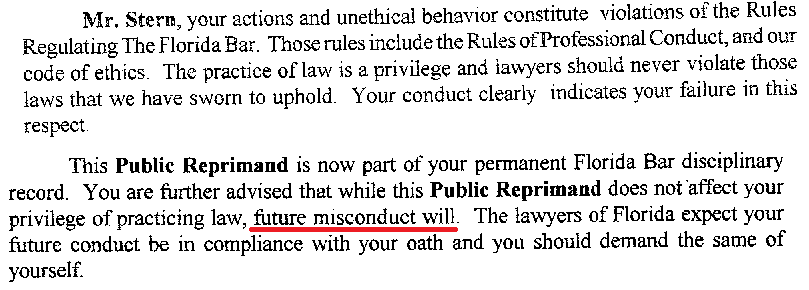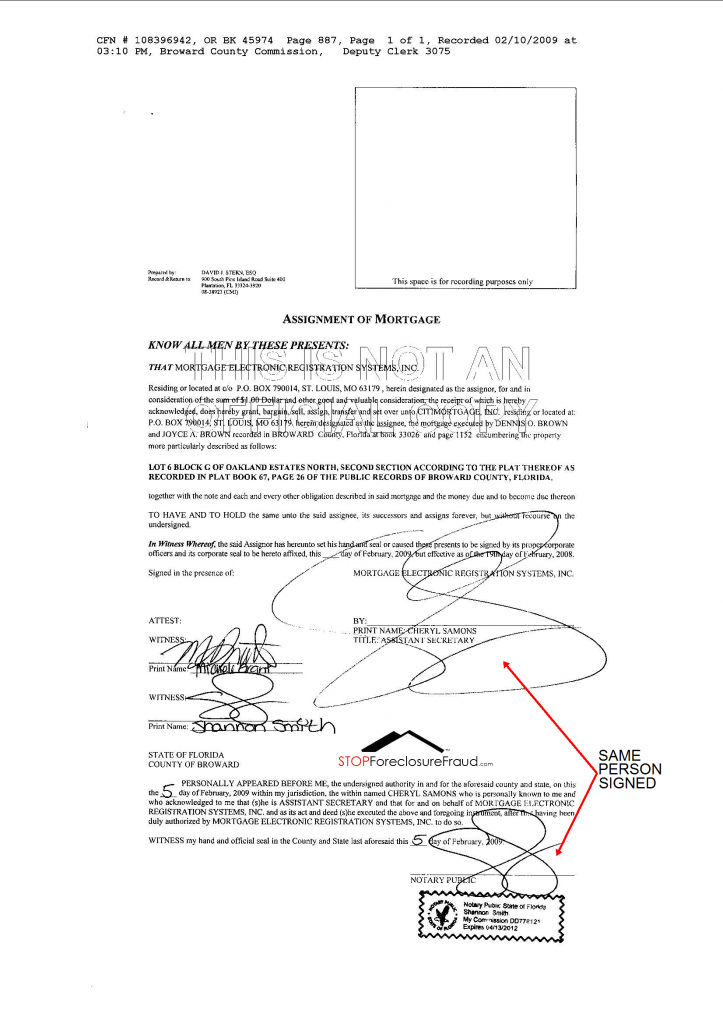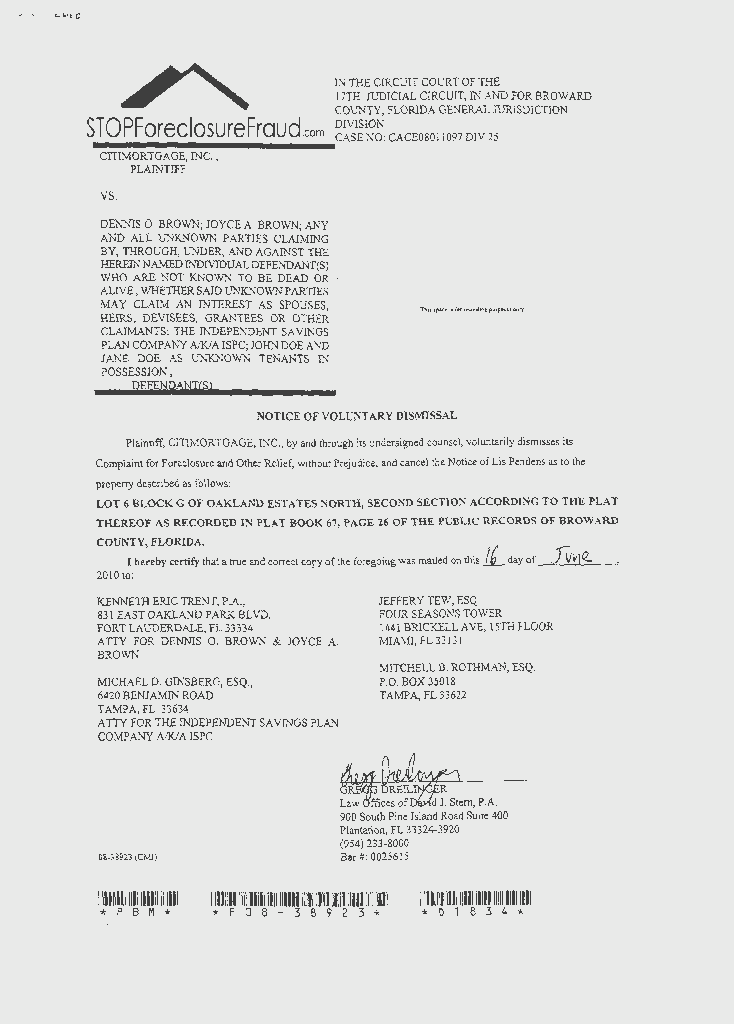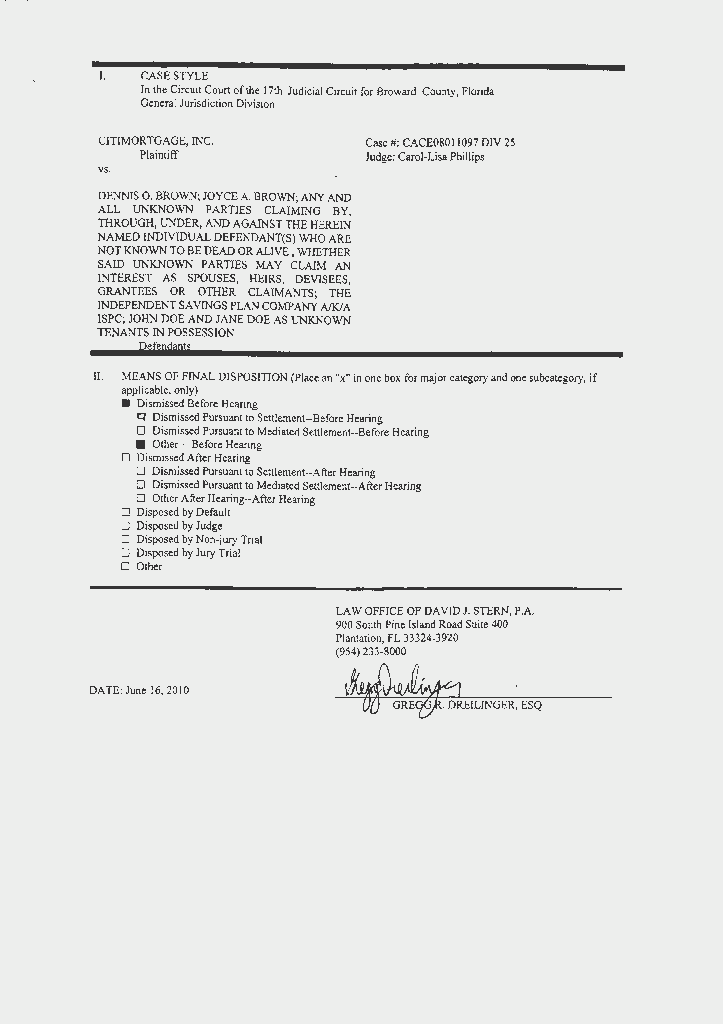EMIGRANT MORTGAGE COMPANY INC v. FITZPATRICK 10
2010 NY Slip Op 20317
EMIGRANT MORTGAGE COMPANY, INC., Plaintiff,
v.
Linda FITZPATRICK a/k/a Linda J. Fitzpatrick, “John Doe 1-10”, said names being fictitious and unknown to plaintiff, the persons or parties intended being the tenants, occupants, persons or corporations, if any, having or claiming an interest in or lien upon the premises described in the complaint, Defendants.
No. 09-10577.
— August 11, 2010
Deutsch & Schneider, LLP Glendale, for Plaintiff.Nassau/Suffolk Law Services Islandia, for Defendant Fitzpatrick.
It is ORDERED that this motion by the plaintiff for an order pursuant to CPLR 3212 granting summary judgment in its favor and striking the answer of the defendant Linda Fitzpatrick a/k/a Linda J. Fitzpatrick (Fitzpatrick); appointing a referee to ascertain and compute the amount due; amending the caption of this action by substituting Haley Lanzafame for John Doe # 1 and striking out John Doe # 2-# 10; and striking the notice for discovery and inspection of the defendant Fitzpatrick pursuant to CPLR 3124(b) is denied.
This is an action to foreclose a mortgage on property known as 1 Forest Drive, East Northport, New York. The defendant Fitzpatrick obtained a loan in the amount of $210,000.00 at a yearly fixed rate of interest of 11.125 percent from the plaintiff and executed a note and said mortgage, both dated April 9, 2008, in favor of the plaintiff. The note indicated monthly mortgage payments to be $2019 .74. The defendant Fitzpatrick defaulted on the monthly loan payment due on September 1, 2008 and those due thereafter. Subsequently, the plaintiff declared the entire amount due.
The plaintiff commenced the instant mortgage foreclosure action on March 25, 2009 alleging that upon information and belief the subject loan is a “sub-prime/high cost” loan and that the plaintiff is the holder and owner of the subject mortgage and note and has complied with Banking Law §§ 595-a and 6-l or 6-m, if applicable, and RPAPL § 1304.
The defendant Fitzpatrick answered asserting a first affirmative defense that the loan was substantively unconscionable because the monthly mortgage payments of principal, interest and taxes of $2,753 .88 were in excess of the defendant’s fixed monthly income of $2,671.00; the plaintiff knew or should have known at the time that the loan agreement was made that the defendant Fitzpatrick’s income was insufficient to cover the monthly payments due under the note; and the plaintiff failed to verify or to even inquire into the defendant Fitzpatrick’s income, which is fixed and easily verifiable, and disregarded income in determining the loan terms to extend to her. In addition, the first affirmative defense alleged that the loan was procedurally unconscionable due to the unequal bargaining power and imbalance of the knowledge and understanding of the parties.
As a second affirmative defense, the defendant Fitzpatrick asserted that the plaintiff engaged in unfair and deceptive practices in the extension of said loan in violation of General Business Law § 349. The second affirmative defense alleged in effect that the conduct of the plaintiff of extending the subject loan to the defendant Fitzpatrick without determining her ability to repay when a reasonable person would expect such an established bank as the plaintiff to offer a loan that he or she could afford was materially misleading. In addition, the defense alleged that said conduct had the potential to affect similarly-situated financially vulnerable consumers and alleged damages in the form of the loss of the defendant Fitzpatrick’s home of 22 years to foreclosure. The defendant Fitzpatrick pointed out in her answer that the mortgage payments she made for June, July and August 2008 prior to her default were paid out of the loan proceeds.
The plaintiff now moves for summary judgment on the complaint on the grounds that the defendant Fitzpatrick defaulted on her loan payments, the plaintiff served the defendant Fitzpatrick with the required notices of default, and the defendant Fitzpatrick failed to cure her default resulting in the acceleration of her loan. In support of the motion, the plaintiff submits a copy of the note and mortgage; the affidavit of facts of the plaintiff’s assistant treasurer; the 90-day notice pursuant to RPAPL § 1304 dated October 29, 2008 and addressed to the defendant Fitzpatrick; the default notice pursuant to paragraph 22 of the mortgage; the “Help for Homeowners in Foreclosure” notice pursuant to RPAPL § 1303; the Fair Debt Collections Practices Act notice; the summons with the “You Are In Danger of Losing Your Home” notice of RPAPL § 1320; the complaint; the answer of the defendant Fitzpatrick; and the affidavits of service. The plaintiff also submits an affirmation regarding “sub-prime” status stating that upon information and belief this is an action to foreclose a residential mortgage loan which is a “subprime home loan” as defined in RPAPL § 1304 or a “high cost” home loan as defined in Banking Law § 6-l (see, CPLR 3408).
In opposition to the motion, the defendant Fitzpatrick contends that the plaintiff’s act of extending said loan was unconscionable as evidenced by the parties’ unequal appreciation of the undertaking and the clearly ascertainable inability of the defendant Fitzpatrick to repay the loan according to its terms such that the plaintiff knew or should have known prior to closing that it would be impossible for the defendant Fitzpatrick to make loan payments. The defendant Fitzpatrick’s attorney states in her affirmation that upon information and belief, the subject loan is the first mortgage that the defendant Fitzpatrick has ever had and that compared to the plaintiff, a large lending institution with extensive knowledge of loans, mortgages and extension of credit, the defendant Fitzpatrick is a homeowner with very limited knowledge of loan terms and the lending process. The defendant Fitzpatrick’s attorney contends in effect that a review of her client’s easily verifiable income would have immediately alerted the plaintiff that the defendant Fitzpatrick could not afford the loan that was extended to her. She further contends that the extension of the subject loan implies an intent by the plaintiff to seize the defendant Fitzpatrick’s home upon her almost inevitable default.
It is well settled that the proponent of a summary judgment motion bears the initial burden of making a prima facie showing of entitlement to judgment as a matter of law, tendering sufficient proof to demonstrate the absence of any material issues of fact (Norwest Bank Minnesota, N.A. v. Sabloff, 297 A.D.2d 722, 747 N.Y.S.2d 559 [2d Dept 2002] ). Failure to make such a prima facie showing requires a denial of the motion regardless of the sufficiency of the opposition papers (De Santis v. Romeo, 177 A.D.2d 616, 576 N.Y.S.2d 323 [2d Dept 1991] ).
In order to establish prima facie entitlement to summary judgment in a foreclosure action, a plaintiff must submit the mortgage and unpaid note, along with evidence of default (see, Capstone Business Credit, LLC v. Imperia Family Realty, LLC, 70 AD3d 882, 883, 895 N.Y.S.2d 199, 201 [2d Dept 2010]; U.S. Bank Natl. Assn. TR U/S 6/01/98 [Home Equity Loan Trust 1998-2] v. Alvarez, 49 AD3d 711, 711, 854 N.Y.S.2d 171 [2d Dept 2008]; Hoffman v. Kraus, 260 A.D.2d 435, 436, 688 N.Y.S.2d 575 [2d Dept 1999] ). The plaintiff’s motion for summary judgment should prove the allegations of the complaint (2-21 Bergman, New York Mortgage Foreclosures § 21.05). Chapter 472 of the Laws of 2008 (known as the Subprime Residential Loan and Foreclosure Law) provides additional protections, including protections against predatory lending practices, to homeowners facing foreclosure whose home loans meet certain standards. The plaintiff seeking to foreclose a home loan that meets said standards must also submit evidence of compliance with the statutes pertaining to that specific type of home loan in order to demonstrate entitlement to summary judgment. If the loan is a high-cost home loan as defined in Banking Law § 6-l or a subprime home loan as defined in Banking Law § 6-m, the plaintiff seeking to meet its initial burden on a summary judgment motion must establish that it is the owner and holder of the subject mortgage and note or has been delegated the authority to commence a mortgage foreclosure action by the owner and holder and has complied with all of the provisions of Banking Law § 595-a and any rules and regulations promulgated thereunder as well as Banking Law § 6-l or § 6-m and RPAPL § 1304 (see, RPAPL § 1302).
The burden then shifts to the defendant to demonstrate “the existence of a triable issue of fact as to a bona fide defense to the action, such as waiver, estoppel, bad faith, fraud, or oppressive or unconscionable conduct on the part of the plaintiff” (Capstone Bus. Credit, LLC v. Imperia Family Realty, LLC, 70 AD3d at 883 quoting Mahopac Natl. Bank v. Baisley, 244 A.D.2d 466, 467, 664 N.Y.S.2d 345 [2d Dept 1997]; see, Nassau Trust Co. v. Montrose Concrete Prods. Corp., 56 N.Y.2d 175, 183, 451 N.Y.S.2d 663 [1982] ). If the loan is a high-cost home loan as defined in Banking Law § 6-l or a subprime home loan as defined in Banking Law § 6-m, it is a defense in a mortgage foreclosure action that the terms of the home loan or the actions of the lender violate any provision of Banking Law § 6-l or § 6-m or RPAPL § 1304 (see, RPAPL § 1302).
Here, the plaintiff has failed to demonstrate through the submission of proof from someone with personal knowledge that the subject loan is either a high-cost home loan as defined in Banking Law § 6-l or a subprime home loan as defined in Banking Law § 6-m and RPAPL § 1304(5)(c) and that the plaintiff has complied with all of the provisions of Banking Law § 595-a, and any rules and regulations promulgated thereunder, as well as Banking Law § 6-l or § 6-m and RPAPL § 1304, as alleged in the complaint. Nowhere in the attorney’s affirmation of regularity or the affidavit of the plaintiff’s assistant treasurer is there any mention or specification or explanation of the subject loan’s exact loan type as either a high cost home loan or a subprime home loan. The Court notes that the plaintiff has submitted a 90-day default notice which is required for a high-cost home loan as defined in Banking Law § 6-l or a subprime home loan as defined in Banking Law § 6-m (see, RPAPL § 1304). If the subject loan is a high cost home loan, then the plaintiff has failed to submit proof that it complied with Banking Law § 6-l (2-a)(a) inasmuch as the subject mortgage lacks a legend on top in twelve-point type stating that the mortgage is a high-cost home loan subject to Banking Law § 6-l (see, Banking Law § 6-l [2-a][a] ). Therefore, the plaintiff’s motion for summary judgment on the complaint is denied inasmuch as the plaintiff failed to meet its initial burden of establishing its prima facie entitlement to judgment as a matter of law (see, Alvarez v. Prospect Hosp., 68 N.Y.2d 320, 324, 508 N.Y.S.2d 923 [1986]; Winegrad v. New York Univ. Med. Ctr., 64 N.Y.2d 851, 853, 487 N.Y.S.2d 316 [1985]; Tyson v. Tower Ins. Co. of New York, 68 AD3d 977, 891 N.Y.S.2d 143[2d Dept 2009] ).
In any event, when a plaintiff moves for summary judgment, it is proper for the court to look beyond the defendant’s answer and deny summary judgment if facts are alleged in opposition to the motion which, if true, constitute a meritorious defense (see, Nassau Trust Co. v. Montrose Concrete Prods. Corp., 56 N.Y.2d at 182). Here, the defendant Fitzpatrick’s opposition to the motion also raises allegations of a violation of Banking Law § 6-l (2)(k) if the subject loan is actually a high cost home loan in that it was made without “due regard to repayment ability ? as verified by detailed documentation of all sources of income and corroborated by independent verification” and a violation of Banking Law § 6-m (4) if the subject loan is actually a subprime home loan (see, Banking Law §§ 6-l [2][k], 6-m [4] ). Consistent with the rule referred to above, the Court considers not only the defenses pleaded but also alleged violations of Banking Law § 6-l (2)(k) and § 6-m (4) (see, id. at 183).
The plaintiff also moves for dismissal of the affirmative defenses of the defendant Fitzpatrick on the grounds that the loan documents that were signed and presumably read and assented to by the defendant Fitzpatrick fully disclosed the amount of monthly loan payments and income required to meet the obligations of the subject asset based loan, that the plaintiff expressly relied on her sworn representations of her ability to repay the loan, and that there was no predatory lending involved inasmuch as it was the defendant Fitzpatrick who approached the plaintiff for a loan so as to avoid tax foreclosure.
When moving to dismiss an affirmative defense, the plaintiff bears the burden of demonstrating that the affirmative defense is “without merit as a matter of law” (see, CPLR 3211[b]; Vita v. New York Waste Services, LLC, 34 AD3d 559, 559, 824 N.Y.S.2d 177 [2d Dept 2006] ). In reviewing a motion to dismiss an affirmative defense, this court must liberally construe the pleadings in favor of the party asserting the defense and give that party the benefit of every reasonable inference (see, Fireman’s Fund Ins. Co. v. Farrell, 57 AD3d 721, 723, 869 N.Y.S.2d 597 [2d Dept 2008] ). Moreover, if there is any doubt as to the availability of a defense, it should not be dismissed (see, id.).
A party is under an obligation to read a document before he or she signs it, and a party cannot generally avoid the effect of a document on the ground that he or she did not read it or know its contents (Cash v. Titan Fin. Services, Inc., 58 AD3d 785, 788, 873 N.Y.S.2d 642 [2d Dept 2009][internal quotations and citations omitted] ). There are situations where an instrument will be deemed void because the signer was unaware of the nature of the instrument he or she was signing, such as where the signer is illiterate, or blind, or ignorant of the alien language of the writing, and the contents thereof are misread or misrepresented to him by the other party, or even by a stranger (Id. at 788 [internal quotations and citations omitted] ).
Whether a contract or clause is unconscionable is to be decided by the court against the background of the contract’s commercial setting, purpose and effect (see, Wilson Trading Corp. v. David Ferguson, Ltd., 23 N.Y.2d 398, 403, 297 N.Y.S.2d 108 [1968] ). An unconscionable contract is one which is so grossly unreasonable or unconscionable in the light of the mores and business practices of the time and place as to be unenforceable according to its literal terms (Gillman v. Chase Manhattan Bank, 73 N.Y.2d 1, 10, 537 N.Y.S.2d 787 [1988][internal quotations and citations omitted] ). A determination of unconscionability generally requires a showing that the contract was both procedurally and substantively unconscionable when made, for example, some showing of an absence of meaningful choice on the part of one of the parties together with contract terms which are unreasonably favorable to the other party (Id. [internal quotations and citations omitted] ). The procedural element of unconscionability requires an examination of the contract formation process and the alleged lack of meaningful choice with a focus on such matters as the size and commercial setting of the transaction, whether deceptive or high-pressured tactics were employed, the use of fine print in the contract, the experience and education of the party claiming unconscionability, and whether there was disparity in bargaining power (Id. at 10-11). The substantive element of unconscionability entails an analysis of the substance of the bargain to determine whether the terms were unreasonably favorable to the party against whom unconscionability is urged (Id.).
With respect to the first affirmative defense that the loan was unconscionable, the plaintiff’s attorney points out in his affirmation that the defendant Fitzpatrick signed a “Resource Letter” on April 9, 2008, which is submitted with the motion papers, indicating that she understood and confirmed her ability to make the initial monthly mortgage payments of approximately $2,754.00 on a timely basis; that she had regular and dependable income from which to make her scheduled monthly payments; that under the standard loan program her annual regular and dependable income would need to be $100,163.00 and that if it was projected to be lower than said sum, she must have additional resources available to fund her monthly payments. In addition, the plaintiff’s attorney points out that the defendant Fitzpatrick received a similar copy of this letter at the time that her loan was approved prior to closing and that she acknowledged that the loan was being made in reliance on said confirmation of her ability to repay. The plaintiff’s attorney also indicates that since the loan was an asset based loan, in which the plaintiff considered the value of the home, and not an income/net worth based loan, the plaintiff was not required to verify the defendant Fitzpatrick’s statements as to income. He further indicates that the defendant Fitzpatrick was therefore required to sign a High Equity Loan Certificate, also submitted with the motion papers, acknowledging that the plaintiff may not have made any independent determination of her ability to repay the loan other than as represented by the defendant Fitzpatrick in the loan application and that the plaintiff may be relying on her said representations.
Here, the plaintiff has failed to demonstrate that the first affirmative defense lacks merit. The High Equity Loan Certificate explains that the subject loan is a High Equity Plus Loan which is a “no income-documentation mortgage loan” and the Resource Letter indicates that it is a loan program that does not enable the bank to independently verify the borrower’s ability to make their scheduled loan payments to repay the loan. Said submissions raise an issue of fact as to whether the mere extension of an asset based secured loan, a type of loan used almost exclusively in commercial business lending to provide working capital, to the defendant Fitzpatrick as a residential home loan was grossly unreasonable or unconscionable (see e.g., Gartenberg v. Wells Fargo Bus. Credit, 1985 U.S. Dist LEXIS 20133 [SDNY 1985]; see also, 2-11 N.Y. Practice Guide: Business and Commercial § 11.03). In addition, the defendant Fitzpatrick’s allegation that the loan agreement was unreasonably favorable to the plaintiff because the plaintiff knew or should have known that she could not afford the terms of the agreement sufficiently states a claim for substantive unconscionability (see, Williams v. Aries Fin., LLC, 2009 WL 3851675 [EDNY 2009] ). Moreover, if the subject loan is actually a high cost home loan, the plaintiff has clearly failed through its submissions to demonstrate compliance with Banking Law § 6-l (2)(k), that the loan was made with “due regard to repayment ability, based upon consideration of the resident borrower or borrowers’ current and expected income, current obligations, employment status, and other financial resources (other than the borrower’s equity in the dwelling which secures repayment of the loan), as verified by detailed documentation of all sources of income and corroborated by independent verification” (see, Banking Law § 6-l [2][k] ). Likewise, if said loan is actually a subprime home loan, the plaintiff has failed to establish compliance with Banking Law § 6-m (4) (see, Banking Law § 6-m [4] ). Therefore, the request for dismissal of the first affirmative defense is denied.
Regarding the defense of unfair and deceptive practices in violation of General Business Law § 349, the plaintiff asserts that the subject loan transaction did not involve any deceptive practice of fraudulent inducement inasmuch as the defendant Fitzpatrick had significant tax arrears when she approached the plaintiff and sought a mortgage to prevent a tax foreclosure. The plaintiff points to the U.S. Department of Housing and Urban Development (HUD) settlement statement in support of the assertion that the defendant Fitzpatrick obtained in excess of $123,000.00 cash at the closing of which approximately $44,058.12 was used to pay the defendant’s real estate tax arrears.
An affirmative defense or a cause of action under General Business Law § 349(a) must allege that (1) the challenged conduct was consumer-oriented, (2) the conduct or statement was materially misleading, and (3) damages (see, Stutman v. Chemical Bank, 95 N.Y.2d 24, 29, 709 N.Y.S.2d 892 [2000]; Lum v. New Century Mtge. Corp., 19 AD3d 558, 559, 800 N.Y.S.2d 408 [2d Dept 2005], lv denied 6 NY3d 706, 812 N.Y.S.2d 35 [2006] ).
Here, the plaintiff has also failed to demonstrate that the second affirmative defense lacks merit. The plaintiff’s proffered proof raises an issue of fact as to whether the act of offering an asset based loan under the plaintiff’s High Equity Plus Program to the defendant Fitzpatrick and other homeowners in similarly financially vulnerable or desperate situations who approached the plaintiff for a loan was materially misleading in violation of General Business Law § 349 (see generally, Aurora Loan Services, LLC v. Thomas, 53 AD3d 561, 862 N.Y.S.2d 89 [2d Dept 2008]; Popular Fin. Services, LLC v. Williams, 50 AD3d 660, 855 N.Y.S.2d 581 [2d Dept 2008] ). Therefore, the request for dismissal of the second affirmative defense is denied.
The plaintiff’s remaining requests for relief are denied.
Dated:___August 11, 2010__________/s/ JEFFREY ARLEN SPINNER____
J.S.C.
© 2010-19 FORECLOSURE FRAUD | by DinSFLA. All rights reserved.































Recent Comments